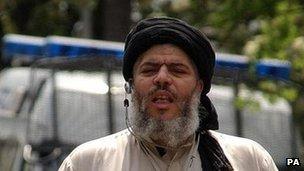Abu Hamza: High Court judge halts extradition to the US
- Published

Abu Hamza is accused of planning to set up a terrorism training camp
A High Court judge has halted the extradition of Abu Hamza al-Masri to the US on terror charges after the cleric launched a last-ditch appeal.
An injunction temporarily stops the removal of the radical cleric and another suspect from the UK and is the latest move in a long legal battle.
The European Court of Human Rights had earlier rejected attempts to block them being sent for trial in the US.
The pair will outline their appeals at a hearing next Tuesday and Wednesday.
On Monday, the European court ruled that the men and three other suspects should stand trial in the US.
The Judicial Office confirmed Abu Hamza and Khaled Al-Fawwaz were "seeking injunctions preventing their removal from the UK".
A spokesperson said: "A High Court judge has considered the applications on the papers and adjourned the cases to a hearing in open court.
"The judge has issued interim injunctions preventing their removal prior to those hearings. The judge has directed the hearings be fixed urgently."
The defendants would need to prove to a judge that there is "some new and compelling factor" that has not been already considered by previous courts.
Legal sources have told the BBC that Mr Al-Fawwaz had new evidence to support his case.
He is said to have been delisted as a terrorist by the US authorities and the home secretary has been invited to reconsider her decision to approve his extradition.
BBC News home affairs correspondent Danny Shaw said one of the grounds for Abu Hamza's legal action was believed to be deteriorating mental health.
He is being represented by lawyers at Sonn Macmillan Walker but the London-based firm declined to comment on the case.
In a statement, it said: "Given the sensitive nature of this matter we regret that we are unable to provide further details at this stage."
A Home Office spokesman said: "The European Court of Human Rights ruled there was no bar to the extradition of these men.
"We will continue working to ensure they're handed over to the US authorities as soon as possible".
'No violation'
The European court's decision meant that Abu Hamza and the four others were facing trials in the US after delays going back to the late 1990s.
It was expected the extradition of the men was likely to happen within weeks as all appeals in the legal process were said to have been exhausted.
The five men claim they would face inhumane treatment in US prisons if handed over.
But in April, the Strasbourg court ruled there would be "no violation" of the suspects' rights if they were put on trial in the US.
In Monday's ruling, the court refused men permission to launch an appeal against that decision.
Abu Hamza is wanted over allegations he plotted to set up a terrorist training camp in the US and was involved in kidnapping Western hostages in Yemen.
The other three suspects facing extradition are Adel Abdul Bary, Barbar Ahmad and Syed Talha Ahsan.
Mr Bary is accused, along with Mr Al-Fawwaz, of being aides to Osama bin Laden in London. Both men have been linked to alleged involvement in the bombing of US embassies in Kenya and Tanzania in 1998.
Mr Ahmad and Mr Ahsan are accused of running a jihadist website in London that provided material support for terrorism.
There has been an 11th-hour attempt to privately prosecute the pair by campaigners opposed to the 2003 Extradition Act.
Their alleged offences occurred in the UK and the campaigners said the British authorities had all the information that was the basis for the US accusations and they should be prosecuted in this country.
- Published24 September 2012
- Published24 September 2012
- Published5 October 2012